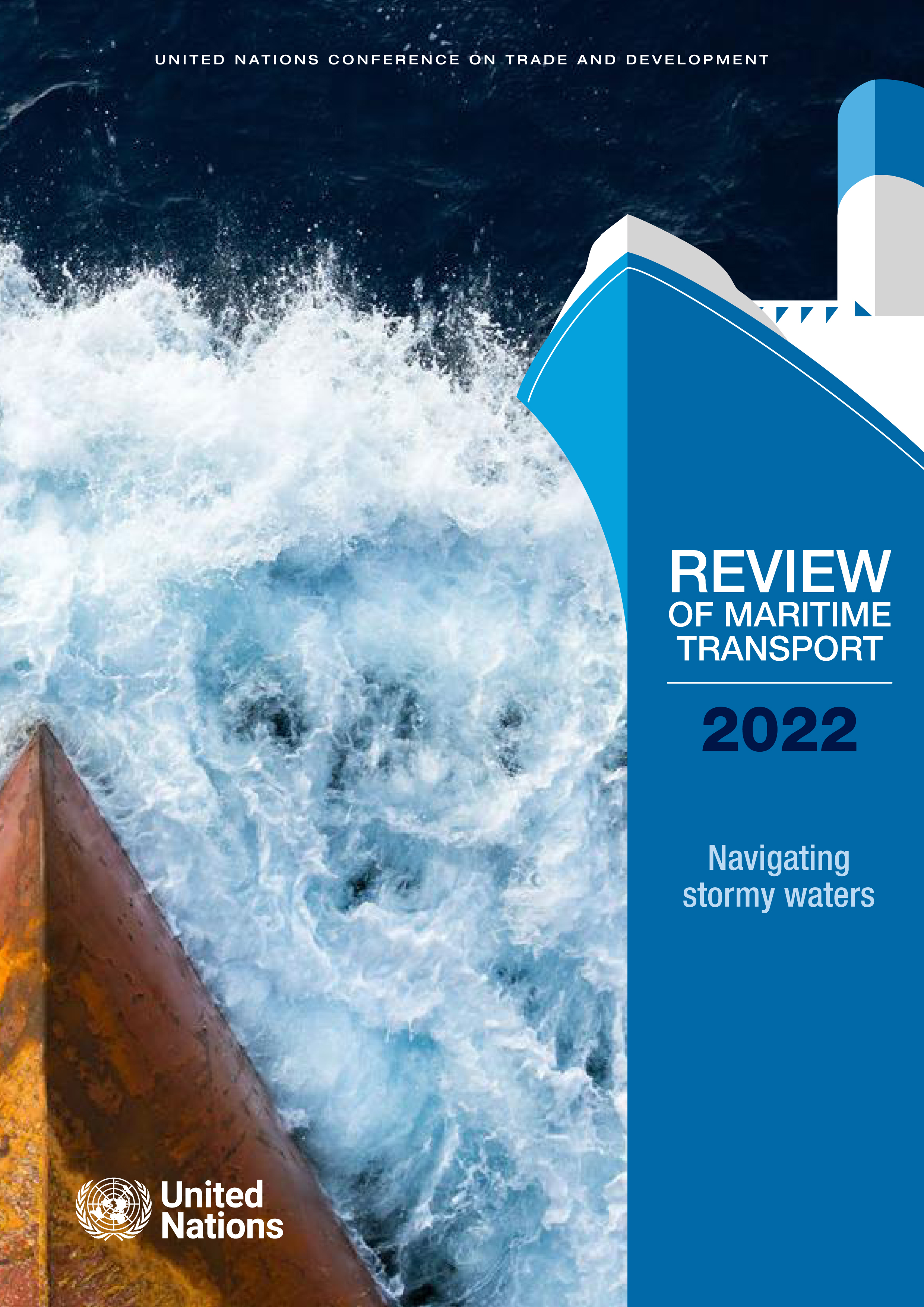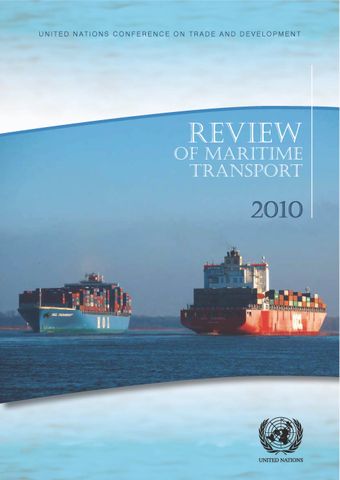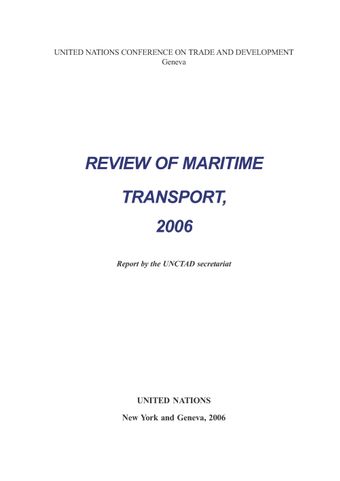- Home
- A-Z Publications
- Review of Maritime Transport
Review of Maritime Transport

Review of Maritime Transport 2024
Navigating Maritime Chokepoints
Global maritime trade grew by 2.4% in 2023 recovering from a 2022 contraction but the recovery remains fragile. Key chokepoints like the Suez and Panama Canals are increasingly vulnerable to geopolitical tensions conflicts and climate change. These disruptions are extending shipping routes straining supply chains and raising costs with profound impacts on food security energy supplies and the global economy as over 80% of world trade volume is carried by sea. Vulnerable economies especially small island developing States and least developed countries are hit hardest by rising shipping costs from rerouted vessels. The Review of Maritime Transport 2024 highlights these challenges calling for urgent action to strengthen industry resilience accelerate decarbonization and support vulnerable economies. It underscores the need for new infrastructure that is sustainable and resilient a faster transition to low-carbon shipping and a crackdown on fraudulent ship registrations to safeguard global trade.

Review of Maritime Transport 2023
Towards a Green and Just Transition
The Review of Maritime Transport is an UNCTAD flagship publication published annually since 1968. Around 80 per cent of the volume of international trade in goods is carried by sea and the percentage is even higher for most developing countries. The Review of Maritime Transport provides an analysis of structural and cyclical changes affecting seaborne trade ports and shipping as well as an extensive collection of statistical information. The report calls for a “just and equitable transition” to a decarbonized shipping industry. The sector whose greenhouse gas emissions have risen 20% over the last decade operates an ageing fleet that runs almost exclusively on fossil fuels. As global leaders prepare for the next UN climate conference (COP28) UNCTAD advocates for system-wide collaboration swift regulatory intervention and stronger investments in green technologies and fleets. Full decarbonization by 2050 will require massive investments and could lead to higher maritime logistics costs raising concerns for vulnerable shipping-reliant nations like small island developing states. The report emphasizes the need to balance environmental goals with economic needs but underscores that the cost of inaction far outweighs the required investments. The report recommends policy actions to overcome supply chain hurdles African countries face including poor logistics low levels of technology fragmented markets limited capital sources and weak institutions and regulations. Beyond cleaner fuels the industry needs to move faster towards digital solutions like AI and blockchain to improve efficiency as well as sustainability. In its analysis of global maritime trends the report highlights shipping’s resilience despite major challenges stemming from global crises such as the war in Ukraine. Maritime trade is expected to grow 2.4% in 2023 and more than 3% between 2024 and 2028.

Review of Maritime Transport 2022
Navigating Stormy Waters
The Review of Maritime Transport (RMT) has been published annually since 1968. The flagship report provides an analysis of structural and cyclical changes affecting seaborne trade ports and shipping as well as an extensive collection of statistics. Around 80% of the volume of international trade in goods is carried by sea and the percentage is even higher for most developing countries. The 2022 RMT covers recent developments in maritime logistics related to the Covid-19 pandemic the war in Ukraine and a special chapter on consolidation and competition issues in container shipping.

Review of Maritime Transport 2021
The Review of Maritime Transport 2021 provides an in-depth analysis and update on developments in seaborne trade the maritime industry and markets key performance indicators and the legal and regulatory environment. The 2021 issue includes a new chapter on maritime trade facilitation issues counting on a number of novel data sets that help analyze the performance of seaports in terms of productivity and connectivity as well as the world fleet in terms of emissions. The 2021 issue also provides a thorough review of the impact and implications that the COVID-19 pandemic has on ports and the maritime businesses and how the industry has responded. It includes a stand-alone chapter assessing the impact of the COVID-19 pandemic on seafarers and difficulties to arrange for crew changes.

Review of Maritime Transport 2020
The Review provides an in-depth analysis and update on developments in seaborne trade the maritime industry and markets key performance indicators and the legal and regulatory environment. The 2020 issue counts on a number of novel data sets that help analyse the performance of seaports in terms of productivity and connectivity as well as the world fleet in terms of emissions. It provides a thorough review of the impact and implications that the COVID-19 pandemic has on ports and the maritime businesses and how the industry has responded. It includes a number of testimonies from industry and government stakeholders to share experiences and good practices of responses to the pandemic.

Review of Maritime Transport 2019
This report provides a concise update of key data relating to the maritime transport sector spanning demand and supply performance as well as transversal issues ranging from regulatory and legal developments affecting maritime transport and technological developments/innovation with the theme being “Sustainable Shipping”. Around 80 per cent of the volume of international trade in goods is carried by sea and the percentage is even higher for most developing countries. The Review provides an analysis of structural and cyclical changes affecting seaborne trade ports and shipping as well as an extensive collection of statistical information.

Review of Maritime Transport 2018
The Review of Maritime Transport is an UNCTAD flagship publication published annually since 1968 with 2018 marking the 50 year anniversary. Around 80 per cent of the volume of international trade in goods is carried by sea and the percentage is even higher for most developing countries. The Review of Maritime Transport provides an analysis of structural and cyclical changes affecting seaborne trade ports and shipping as well as an extensive collection of statistical information.

Review of Maritime Transport 2017
With over 80 per cent of global trade by volume and more than 70 per cent of its value being carried on board ships and handled by seaports worldwide the importance of maritime transport for trade and development cannot be overemphasized. The 2017 Review of Maritime Transport presents and discusses key developments in the world economy and international trade and related impacts on shipping demand and supply freight and charter markets as well as seaports and the regulatory and legal framework. In addition to relevant developments in 2016 and the first half of 2017 this year’s edition of the Review also features a special chapter on maritime transport connectivity reflecting the prominence of physical and electronic connectivity as a priority area in the trade and development policy agenda.

Review of Maritime Transport 2016
The Review of Maritime Transport is an UNCTAD flagship publication published annually since 1968. It provides an analysis of structural and cyclical changes affecting seaborne trade ports and shipping as well as an extensive collection of statistical information. The present edition of the Review of Maritime Transport takes the view that the long-term growth prospects for seaborne trade and maritime businesses are positive with ample opportunities for developing countries to generate income and employment and help promote foreign trade.

Review of Maritime Transport 2015

Review of Maritime Transport 2014
As in previous issues since 1968 the 2014 Review of Maritime Transport contains a wealth of analysis and unique data. The Review is the renowned United Nations source of statistics and analysis on seaborne trade the world fleet freight costs port traffic and the latest trends in the legal and regulatory environment for international maritime transport. This year’s Review includes a special chapter on maritime transport challenges for Small Island Developing States (SIDS) covering issues such as the impact of climate change port investment shipping connectivity and transport costs.

Review of Maritime Transport 2013
As in previous issues since 1968 the 2013 Review of Maritime Transport contains a wealth of analysis and unique data. The Review is the renowned United Nations source of statistics and analysis on seaborne trade the world fleet freight costs port traffic and the latest trends in the legal and regulatory environment for international maritime transport. This year’s Review includes the 10 year time series of unique data on liner shipping connectivity. Underlining recent research that suggests that containerization had a stronger impact on driving globalization than trade liberalization the Review discusses global developments in containership deployment and then looks at trends liner shipping connectivity in Latin America Africa and Asia.

Review of Maritime Transport 2012

Review of Maritime Transport 2011

Review of Maritime Transport 2010
More than 80 per cent of international trade in goods is carried by sea and an even higher percentage of developing-country trade is carried in ships. This annual publication is an important source of information on this vital sector. It closely monitors developments affecting world seaborne trade freight rates ports surface transport and logistics services as well as trends in ship ownership and control and fleet age tonnage supply and productivity. The Review contains a chapter on legal and regulatory developments and each year includes a chapter highlighting a different region. In 2010 the focus is on Asia and the Pacific.

Review of Maritime Transport 2009

Review of Maritime Transport 2008
This annual review identifies the main developments in world maritime transport and provides world-wide statistical data. It takes a look at supply/demand equilibrium in containerized shipping shipbuilding and shipscrapping the development of ports privatization and freight markets among other relevant areas. It also presents extracts of the United Nations Code of Conduct as it relates to the areas discussed.

Review of Maritime Transport 2007
The 2007 review identifies the main developments in world maritime transport and provides relevant statistical data. It focuses on developments concerning maritime activities in developing countries as compared with other groups of countries. It highlights the correlation between the development of global trade and maritime transport activities in general with particular attention given to regional developments in Asia.

Review of Maritime Transport 2006
The Review of Maritime Transport an annual publication provides comprehensive and up-to-date statistics and information on maritime and ancillary services. The Review focuses on developments concerning maritime activities in developing countries as compared with other groups of countries. In the 2006 edition particular attention is given to regional developments in sub-Saharan Africa.

Review of Maritime Transport 2005
The Review of Maritime Transport an annual publication provides comprehensive and up-to-date statistics and information on maritime and ancillary services. The Review focuses on developments concerning maritime activities in developing countries as compared with other groups of countries. In the 2005 edition particular attention is given to regional developments in Latin America.
